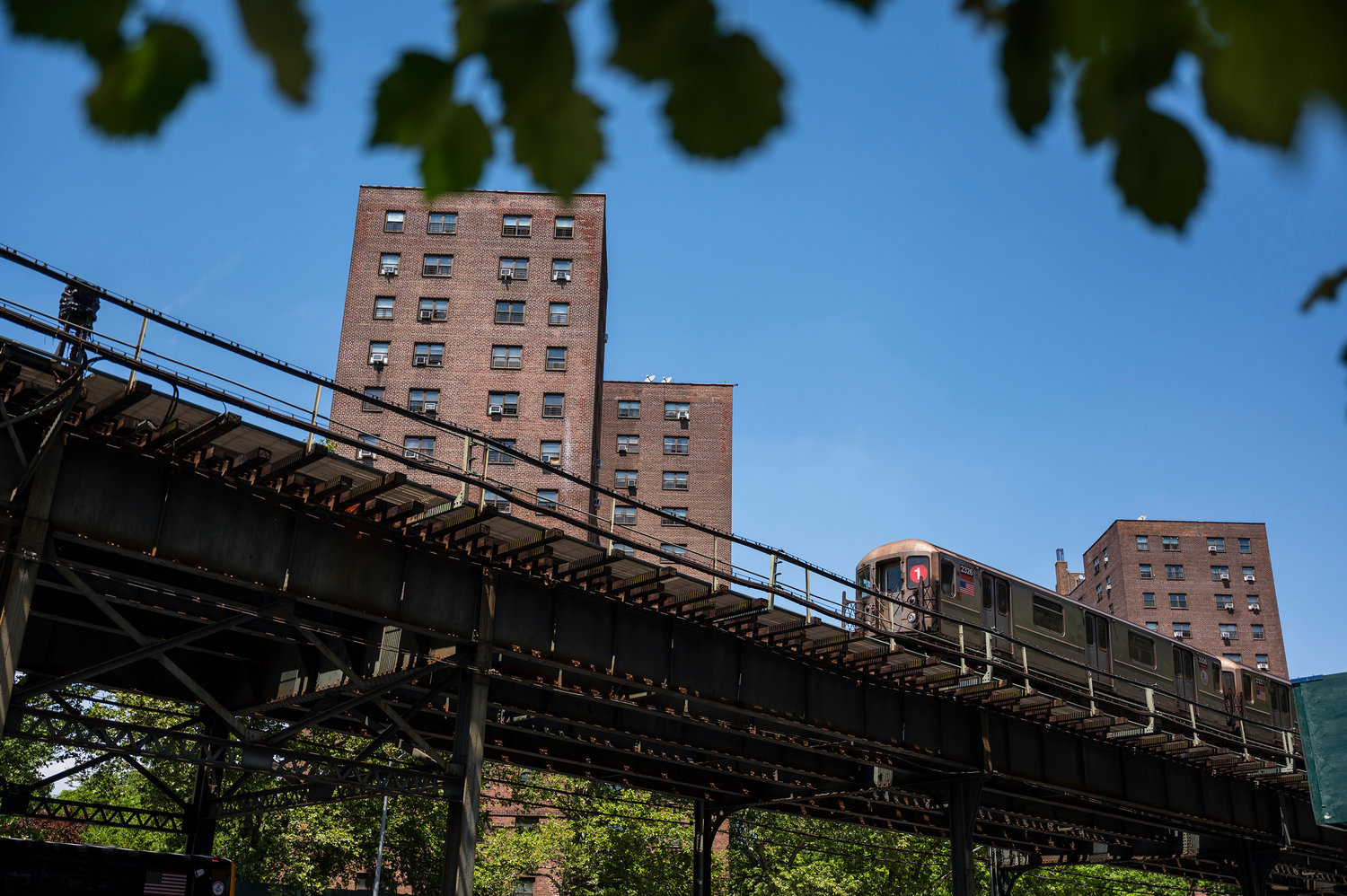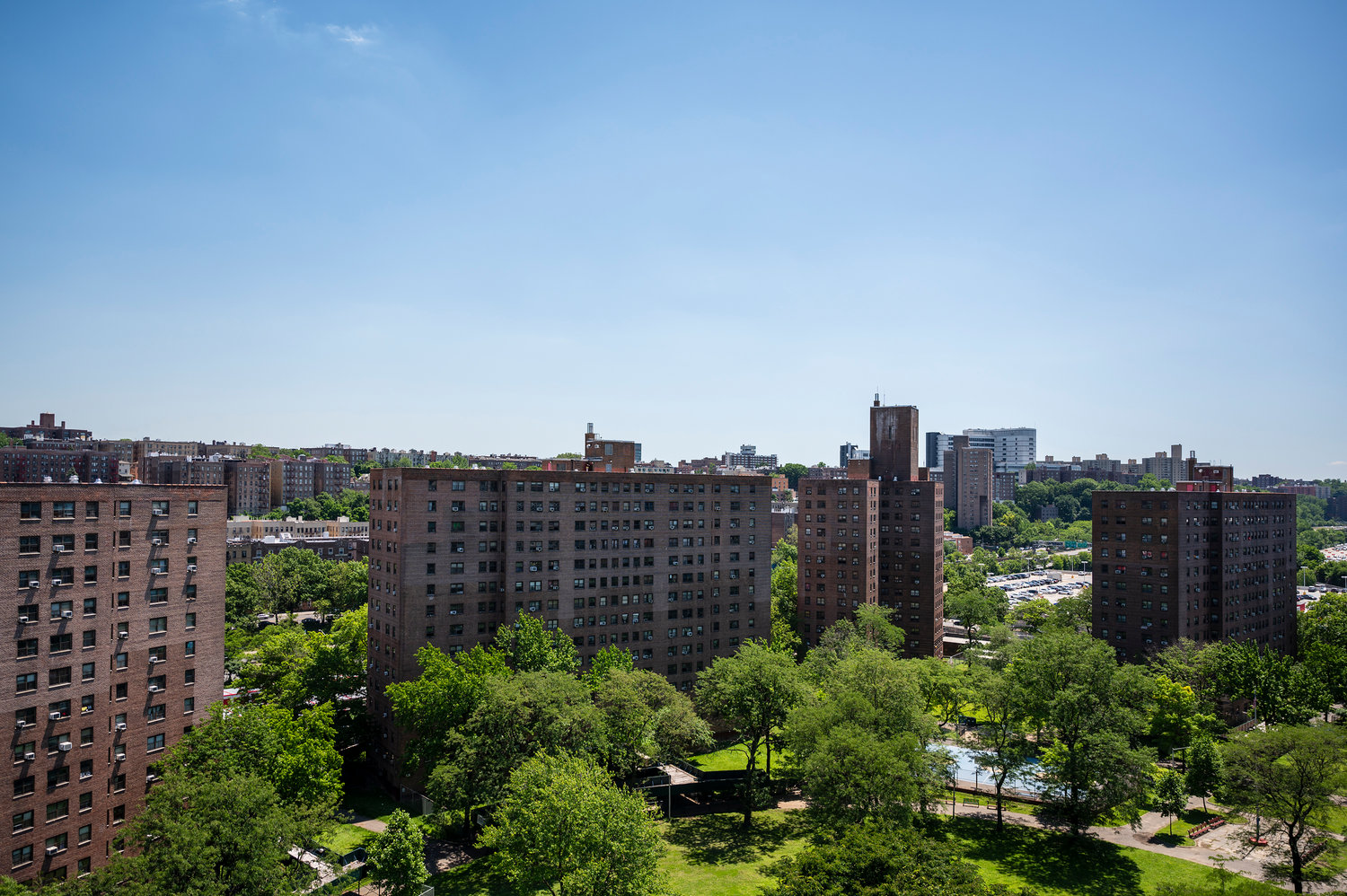NYCHA gets much-needed financing authority
State vote remakes how housing agency works — could benefit Marble Hill Houses
The New York City Housing Authority will soon move forward in its plan to place some 25,000 apartments into a new NYCHA Preservation Trust — a public benefit corporation state lawmakers voted to establish last week.
The creation of the trust is the first major hurdle in a plan NYCHA chair and chief executive Gregory Russ outlined two years ago to raise billions of dollars necessary to bring its portfolio of over 177,000 apartments into a state of good repair and comply with basic health and safety standards.
Once Gov. Kathy Hochul signs the legislation, NYCHA will be able to apply for valuable Section 8 housing vouchers for apartments placed in the trust, and issue bonds backed by their revenue from the leases. The so-called “Blueprint for Change” offers a novel interpretation of the U.S. Housing Act and ushers the country’s largest public housing authority into a new funding paradigm.
The bill is a revised version of a similar one that foundered last year. Its fate remained uncertain this year until the final weeks of the legislative session when Sen. Julia Salazar, a former Republican turned Democrat, stepped in to sponsor it alongside Democratic Assemblyman Steven Cymbrowitz, forming an unlikely alliance that pushed the bill through the Assembly by a vote of 132-18 Wednesday and onto the senate, where it passed Thursday by a vote of 38-25.
With units placed in the trust, NYCHA can apply for Section 8 tenant protection vouchers for units placed in the trust, gaining access to a more accessible funding stream that has proven historically more reliable than Section 9 of the Housing Act, which funds public housing. NYCHA will then be able to issue municipal bonds backed by the revenue from the units’ leases.
“To a certain extent this is subjecting public housing to market forces,” said Elizabeth Gyori, a staff attorney with Legal Services NYC/Manhattan. “You are allowing bonds to finance public housing and therefore there is a market logic behind that. It’s how a lot of public infrastructure is funded.”
In the lead up to last week’s vote, the bill won support from several groups that had been reluctant to endorse it, including Community Service Society and The Legal Aid Society, which said the preservation trust was a “one-time opportunity” for NYCHA to access full capital funding to remediate living conditions in its buildings.
“This is a major win for New Yorkers who call NYCHA home,” Hochul said in a statement after last week’s Senate vote. “This legislation has the power to unlock additional federal funding and lead to billions of dollars in renovations — after decades of federal disinvestment — and provide for critical improvements at developments across the city.”
The atmosphere was jubilant outside the Nostrand Houses in Sheepshead Bay Saturday, where Mayor Eric Adams and state representatives gathered with residents to celebrate a key victory in the mayor’s Albany agenda.
“The bottom line is tenants, you did it,” Adams said. “Because none of us would have supported this, if you didn’t advocate for it.”
But the bill’s reception was more tepid among the remaining 400,000 NYCHA residents living in 335 developments across the city, some of who received packets of information about it in a language they could not understand.
“A lot of tenants I speak with have concerns about this plan,” said Gyori. “In particular NYCHA says they’re going to contract back the management to NYCHA after the conversion of a bundle of buildings. Why would you have NYCHA continue the operations of this building? NYCHA might not be properly reformed, and they’ll be stuck with the same management they have right now.”
Many of the 3,176 residents of Marble Hill Houses, which are currently undergoing a $42 million heating system overhaul, came home last March to find copies of a 60-page PowerPoint slung on their doorknobs in plastic bags.
“There are certain unknowns,” said tenant association president Tony Edwards. “The rent is still supposed to be 30 percent of your income. But how much can you really trust it? The housing authority itself does not have the best track record. People are suspicious of what they say.”
Edwards said it’s a struggle to find space for tenants to discuss their options.
“The thing is, we have the opportunity to go into the program or stay out. In order to really get a full consensus of people, I have to create a large enough forum to have a pro/con discussion. When it comes to a meeting, I’m lucky if I get 25 residents. At the tenants last meeting, only a handful showed up.”
Assemblyman Jeffrey Dinowitz, who voted for the trust, was persuaded to make that vote based on some last-minute changes.
“One thing that tipped me over is that residents will have a vote,” Dinowitz said, pointing to a key revision that gives residents a say in the decision to transfer units into the public trust. It calls for a “minimum percentage” of tenants to participate, though questions remain about how NYCHA will interpret this language.
“If only 5 percent of residents vote, it’s hard to consider that a legitimate vote,” he said. “What the magic number is, I’m not sure. The board will have to determine that, and it has to be a democratic action.”
Dinowitz voted for the bill despite some reservations. He said the Bailey Houses on 193rd St were in better shape when he lived there.
“At the time I never gave it much thought. It didn’t have a lot of problems. It wasn’t that old at the time. It breaks my heart when people have to live in terrible conditions.”
And lawmakers continued to express concerns NYCHA residents in their districts have raised.
Public housing represents one of the few truly affordable options available to New York renters, and NYCHA plays an outsized role in housing low-income families. A 2017 survey found the average income of NYCHA residents was $24,000. Yet its properties have deteriorated dramatically in recent decades, due in part to federal disinvestment, which has perpetuated a cycle in which deferred repairs further widen the funding gap every year. Hazards abound, from pealing lead paint to frequent heat and hot water outages, rat infestations, leaks, and ceilings carpeted with mold. NYCHA estimates it needs about $40 billion to bring its buildings into a state of good repair.
The idea for a public trust originated in guidance the U.S. Department of Housing and Urban Development issued in 2018 creating a path for NYCHA to preserve units deemed obsolete according to health and safety criteria. NYCHA will lease these units to the public trust while retaining ownership and continuing to manage them. The law calls for a nine-member board of trustees to govern the preservation trust, with seats held by NYCHA’s chief executive and chief financial officers, the deputy mayor for housing and economic development, and three appointed each by the mayor and NYCHA’s chief executive. The appointments will include at least four NYCHA residents.
A South Bronx-based group called Save Section 9 has fought to highlight the lack of tenant engagement in the lead up to last week’s Albany vote and the broader plan NYCHA began rolling out in 2019 and 2020 dubbed the Blueprint for Change.
I think “25,000 units is too many all at once. We call the blueprint RAD/PACT on meth,” said co-founder Ramona Ferreyra, referring to NYCHA’s Rental Assistance Demonstration program, which converts units to Section 8 in the U.S. Housing Act and leases buildings to private management companies to renovate them.
Ferreyra lives at Mitchel Houses in Mott Haven, and previously participated in NYCHA’s tenant forums, but soon became disillusioned with the housing authority’s focus on Section 8 conversions.
“When we’re talking about saving Section 9, one thing we really highlight is the lack of tenant engagement, she said. “The fact is you have a cluster of folks in the Bronx who are not supporting the legislation. The only public housing recognized in America is the one under the congressional code Section 9. Section 8 doesn’t have those protections built into the law.”
Louis Flores, who founded a Bronx group called Fight for NYCHA had similar criticisms.
“The number one problem we have with the trust is that NYCHA has never wanted to submit to any oversight or accountability,” Flores said. “They’ve never wanted anybody to tell them what to do. We know this for a fact and that’s how they let the conditions get so bad.”









